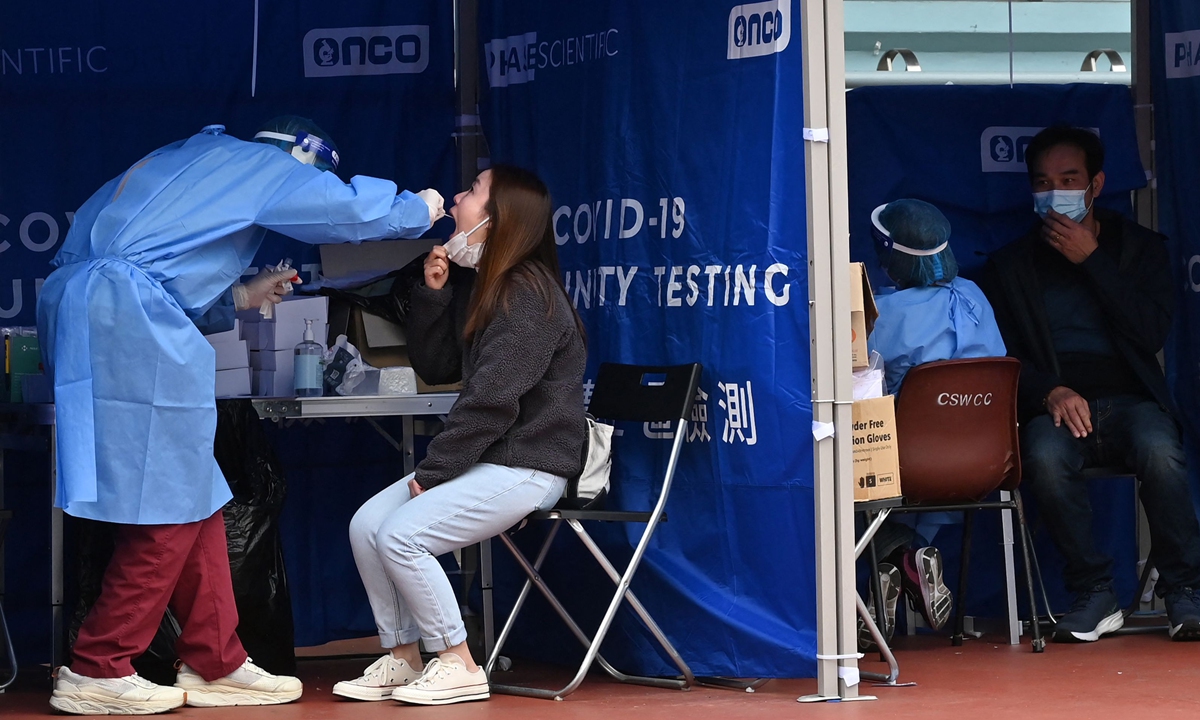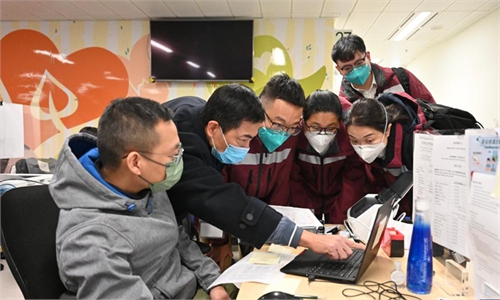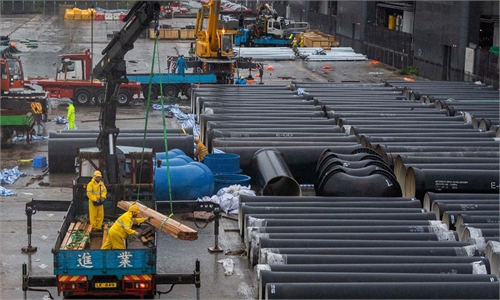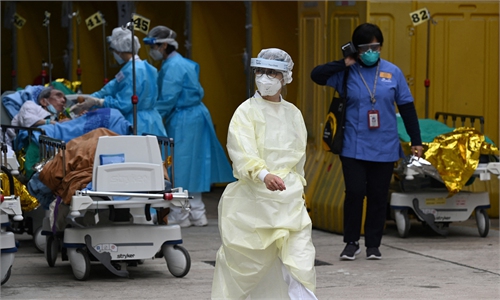
A woman is tested at a mobile specimen collection station for COVID-19 in Hong Kong's Prince Edward district on February 8, 2022, as authorities scrambled to ramp up testing capacity following a record high of new infections. Photo: VCG
While the race against time to build two makeshift hospitals continues and property developers lend hotel rooms as quarantine facilities to alleviate Hong Kong's overloaded medical resources and offer more suitable places to quarantine patients, COVID-19 infections in the city reached a record high on Monday, with 7,533 confirmed cases reported.
In addition to those confirmed cases, another 6,892 initially positive cases were also reported. Monday saw 13 more deaths registered, including an 11-month-old girl, according to the SAR government's department of health.
The SAR government on Monday said vaccine passes, which will allow people to enter public venues such as shopping malls, will be rolled out this Thursday. Experts believe the measure will raise vaccination rates, especially among elderly people, which has been the weak link in Hong Kong's anti-epidemic fight.
In an interview conducted with China Central Television, Chairman of Hospital Authority Henry Fan Hung-ling said the hospital system is overloaded and in shortage of hands. Meanwhile more than 800 medical personnel in Hong Kong have been infected.
The expert team from the mainland offered their valuable experience such as how to prevent patients from having severe symptoms and how to treat seniors and minors, Fan said, hoping the central government could dispatch more medical staff to Hong Kong to alleviate the shortage of medical staff.
Jin Dongyan, a biomedical professor at the University of Hong Kong, told the Global Times on Monday that the mounting infection numbers will likely last one more week before declining, with more potential infections going undetected among communities.
In a bid to quarantine as many infected residents as possible, the Global Times learnt from the China State Construction Engineering Corporation (CSCEC) that two community isolation treatment facilities in Penny's Bay and Kai Tak Cruise Terminal are expected to provide about 9,500 quarantine units with both single room and family suites. They will mainly be used to treat and quarantine asymptomatic patients and patients with mild symptoms.
The CSCEC said it is ramping up efforts to ensure the facility in Penny's Bay will be delivered to the government in six batches, while the one in Kai Tak Cruise Terminal will be delivered in three separate batches. Construction of the facility saw around 200 people gathered at the site, with the number of workers participating in construction likely to surpass 5,000.
When the epidemic is over, those facilities can be adjusted for use as transitional social housing for some 20,000 people, the CSCEC said.
Meanwhile, property developers, including billionaire Li Ka-shing, Sun Hung Kai Properties, New World Development and Henderson Land Development showed support by lending out hotel rooms for quarantine accommodation. Some have lent land for the construction of makeshift hospitals, and also donated large numbers of kits and anti-epidemic materials.
Jin said turning hotel rooms into quarantine facilities is of great value for COVID-19 patients who cannot undergo home quarantine as they share rooms with family members. However, as this wave of infections originated from imported patients who were undergoing quarantine in hotels, whether those hotels are qualified to be used as quarantine facilities should be further evaluated.
The construction of makeshift hospitals and more hotel quarantine accommodation will greatly alleviate pressure on medical resources and allow more people to quarantine separately so as to cut off infection chains, Jin said, adding that quicker nucleic acid testing is also a matter of urgency. Faster return of testing results means more potential positive cases can be quarantined in a timely manner.
Data provided by the SAR government showed 71 testing stations have been set up across the city. With aid from the mainland, Hong Kong's nucleic acid testing capability will be greatly boosted.
A set of mobile inflatable testing laboratories provided by Guangzhou-based Kingmed Diagnostics underwent final debugging on Monday after being delivered to Hong Kong over the weekend, the Global Times learnt from Kingmed on Monday.
The mobile lab, consisting of five air-inflated chambers, can handle 80,000 tubes a day. Kingmed's testing capability can reach 200,000 tubes if an extra lab from the company is utilized in Hong Kong, the Global Times was told.
BGI Group had said it will deploy two or three more Fire Eye laboratories from the mainland to Hong Kong if the city decides to launch mass testing. Three Fire Eye laboratories will be able to handle more than 300,000 tubes every day.



